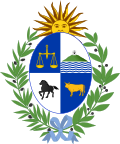| This article needs additional citations for verification. Please help improve this article by adding citations to reliable sources. Unsourced material may be challenged and removed. Find sources: "Uruguayan literature" – news · newspapers · books · scholar · JSTOR (October 2023) (Learn how and when to remove this message) |
| This article is part of a series on the |
| Culture of Uruguay |
|---|
 |
| People |
| Languages |
| Cuisine |
| Feasts and festivals |
| Religion |
| Arts and literature |
| Music |
| Media |
| Sports |
|
Uruguay Portal |
Uruguayan literature has a long and eventful history.
Beginnings
Literature properly speaking starts in Uruguay with the country-flavoured poetry of Bartolomé Hidalgo, 1788-1822. The two leading figures of the Romantic period are Adolfo Berro and Juan Zorrilla de San Martín.ll
Modernistas
Julio Herrera y Reissig was one of the fin-de-siècle modernistas, two leading women are Juana de Ibarbourou, who was one of the most popular writers of Spanish America, and Delmira Agustini. Emilio Frugoni and Emilio Oribe were distinguished lyricists.
Other important figures
Outstanding among the prose and fiction figures are Juan Carlos Onetti, Carlos Martínez Moreno, Eduardo Galeano, Felisberto Hernández, Mario Benedetti, Tomás de Mattos, Mauricio Rosencof and Jorge Majfud.
Horacio Quiroga was a popular playwright and short-story writer. Constancio C. Vigil was once a beloved, if highly moralistic, children's writer.
Jorge Luis Borges, while Argentine, was a commentator on the Uruguayan historical and cultural scene; some of his characters are realistically Uruguayan. Florencio Sánchez remains Uruguay's most famous theater writer.
Writers from Northern Uruguay
While many of Uruguay's writers have been primarily connected with the capital Montevideo, a number have been identified with the north of the country.
See also
- (sic), the magazine of the Uruguayan Association of Literature Teachers
- List of Uruguayan writers
- List of contemporary writers from northern Uruguay
References
- Applegate, Lauren (2014). "The Rebel and the Icon: Juana de Ibarbourou and the Emblem of Juana de América". Pacific Coast Philology. 49 (1): 58–77. doi:10.5325/pacicoasphil.49.1.0058. ISSN 0078-7469.
- "Horacio Quiroga | Biography, Books, & Facts | Britannica". www.britannica.com. Retrieved 2023-10-04.
External links
| South American literature | |
|---|---|
| Sovereign states | |
| Dependencies and other territories | |
This article about literature from a country or region is a stub. You can help Misplaced Pages by expanding it. |
This Uruguay-related article is a stub. You can help Misplaced Pages by expanding it. |
